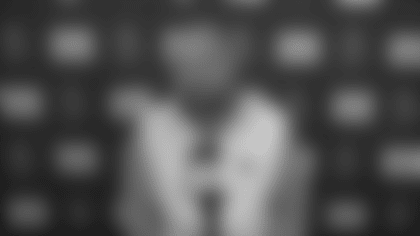Head Coach Pat Shurmur
Friday. This is a good couple of days for us. We have the officials here, so they were able to watch practice yesterday, work with the players. They talked to the players last night and showed a video. We had a really good, open dialogue about some of the rule changes, some of the emphasis, some of the OPI-DPI (offensive/defensive pass interference) stuff. It was really a good back and forth between the players and the crew that's here. I thought Shawn Hochuli and the guys that are here did a good job with that. We're going to do the best we can to learn as much from these guys, with regard to some of the rule changes, in the next couple of days. Then there'll be continuing dialogue. I think we, as coache, will use the preseason to see how these rules are applied. With that, I'll take your questions.
Q: How do you approach the new process (of challenging pass interference calls)? Do you do anything special?
A: Well, it's a new deal. We have our system in place for challenging, so to speak. It's going to come down to if we think the call should be changed or not, based on what we either see live or maybe have some visual evidence of. There's going to be a lot of calls, and we've seen it in the past that didn't apply to replay, where if it was called one way, it would stand, and if it was called another way, it would stand. There are a lot of those-type calls. I think the challenge will be for all of us to try to get it right.
Q: Will you be hesitant to challenge earlier in the game, knowing you could lose an opportunity for later?
A: No. I think we're all going to be aware of that, but I do think… There could be a big play that happens early in the game, so we just have to use our judgement on that. The OPI-DPI stuff, it goes back to the officials inside the two minutes. Yeah, it's just one of those things we'll deal with.
Q: What did you think of the throw Daniel (Jones) made down the sideline to (Paul) Perkins yesterday?
A: It was outstanding. He's made excellent throws in every practice, and that was evidence to me that he has the arm to play in this league. We sort of knew that before we picked him. We've seen it throughout the training, and that was actually a very good throw.
Q: You've said previously that you want him ready for Week One. Where is he on that timeline in your view, in terms of being ready?
A: He's on-track to be ready when it's his time to play. He's made progress each day. He does something good each day. Now there's always mistakes each day that he then cleans up. The challenge is to not repeat a mistake. That's why I'm not really down on once in a while a guy screwing something up, because now that's something to talk about as you move forward.
Q: For as good as Saquon (Barkley) was last year, what do you see that's different in him, or better in him, in this camp from last year to this year?
A: I think there's just a little bit more confidence in what he can expect to see from his teammates, coaches, and the way we function. He's a year two guy, and usually, for talented people that work hard at what they do, you can see an improvement between year one and year two. Sometimes it's their biggest improvement.
Q: When you look at his production last year, is it difficult to have an encore for something that was that good, that quickly? When you set the bar that high that quickly?
A: Maybe for some guys that will rest on their laurels, but I don't see that in Saquon. He's a guy that's just trying to get better every day.
Q: Will (Hernandez) is another second-year guy who says he's changed the way he went about his offseason from last year to this year. What are the expectations for him to take the next step? What does that next step look like for him?
A: I think he needs to play consistently well from the first game on. Last year, he got better as the year went on. But we have to play well out of the gate, and I think that's important. With regard to his offseason, we told the rookies that cautionary tale that after your rookie season, that really is the first offseason where it's on you to decide how you're going to train. So that's a challenge for them. I think Will did a pretty good job of doing a lot of the right things so that he could have a good spring and then a good training camp. It doesn't seem like a big deal, but it is a big deal. Prior to their rookie year, they're training for the combine and then they're quickly into the offseason stuff, where when the season is over, that's the first time where they're like, 'Wow, I'm on my own. How do I do this?' So we tried to help him. He took some of our advice, and then he just did a good job on his own.
Q: How much of James Bettcher, what he wants to do on defense, did we actually see last year? We know the personnel wasn't a perfect match when he first got here. How much of what he wants to do, what he did in Arizona, did he actually do last year?
A: I think there's a good amount of scheme that he did. But again, it's year two, we have some new players, some guys that we feel like can make the defense better incrementally just by being here. By them playing together another year, it always comes down to a team on defense. I think they'll be improved in that regard as well.
Q: In terms of another young guy, Kyle Lauletta, what have you seen in terms of his development from last year to this year?
A: I think he's much improved from a year ago. A guy in his situation could maybe approach it differently, but he's out here every day trying to get better. He makes the most of his reps. He's really engaged with everything that's going on. I'm very pleased with how he's approaching his work.
Q: How aware do you think he is that even if there isn't an opportunity for him here, young guys sometimes don't understand that people across the league are watching all the time. How aware do you think he is of that?
A: I think he's aware. I think everybody is aware. The challenge when you have a 90-man roster, and I've told the players this, is 'What I want for you is to make our team or somebody else's. That means you played well.' That could be said for Kyle. I'd love for him to make our team. I'd keep 20 quarterbacks. I'd love for him to make our team or somebody else's. For him to make somebody else's team, when he's out there, 31 other teams are watching him perform. That gives you the best chance.
Q: You do have a roster limitation. Where do you stand on the number of quarterbacks you keep? Would you contemplate keeping two? Would you want a third?
A: We're going to do what's best for the roster. We'll see how that goes.
Q: Have you ever kept just two before?
A: I've been in places where there were two and a practice squad guy. I've been in places where we've had three and a practice squad guy. I've been in places where there have been a lot of different situations.
Q: Nate Solder got a lot of heat last year for a lot of reasons. He struggled early, he signed the big contract. When you look back and assess his year last year, how much better did he get as it went along, and how much better do you think he can be in year two with your system?
A: I don't know about criticism for the money he was paid. I don't know about any of that. I thought he played… as Will got better, what people thought of Nate improved. It just goes to show you that the guys working together is very important on the offensive line. He was a very consistent guy. He battled all year, especially early on when we were having a tough stretch. I thought he did a lot of good things last year.
Q: Do you have an update on Grant Haley, and was Markus Golden a rest day yesterday?
A: Grant Haley. He dove for a ball yesterday and fell on his shoulder. He's going to be fine. And yeah, Markus Golden was a rest day. Perfect. I love the questions that have the built-in answers. I love that.
Q: You said Saquon isn't the type of guy who would rest on his laurels. Are you kind of in his ear telling him to work on one specific part of his game, or has he kind of approached this offseason on his own?
A: No, we're coaching him up on everything. When we speak to the team, and I can tell when I'm speaking to the team, he's listening. Then we talk to him about a lot of different things. But a lot of what makes Saquon who he is comes from within. He's kind of carrying that out.
Q: From an outside perspective, he seems a lot more vocal this year. We hear him talking a lot more trash back and forth, cheering, I see him going up to you and going over stuff. How much does that differ from last year? Has he sort of opened up even more? Is he more comfortable?
A: Yeah, probably so. I think that's probably a year two thing. As you get more settled with things, you tend to be a little bit more vocal. I sort of saw that behind the scenes last year. I guess the world is starting to see it a little bit more now.
Q: With the young kid Austin Droogsma, the shot putter, can you appreciate a story like that, as much of a longshot as he is? What kind of development have you seen with him?
A: He's developed. I think it's fair to say since he hasn't played football in a very long time, to then try to do it at this level is a big challenge. To his credit, he needed to lose some weight and get in shape just to attempt to make the team. He did that and took care of that in the offseason. We'll just have to see where it goes. It's safe to say, him being out of football for as long as he was, it's kind of put him behind a little bit.
RB Saquon Barkley
Q: Bucket hat, huh?
A: I need a haircut, that's why. I'm hiding the hair.
Q: You mentioned the first time you were here that pass protection was something you were really working on. How's it going?
A: Going pretty well. Just picking Eli's (Manning) brain, picking the coaches' brains, watching film, picking (Alec Ogletree) Tree's brain, he does a really good job of understanding defense, and they do a really good job of hiding blitzes and bringing crazy blitzes. So, I think it's really good for me to be able to go up against a defense like that, and have a guy like Tree over there who knows it so well that if they throw a funky look at me that I'm not used to seeing, I can go up and ask him. That's the kind of way that I've kind of been approaching it, asking questions, learning, and I'm just trying to be on point and trying to elevate my game in that area.
Q: We can hear you a little more in practice this year talking trash to the defense and that type of thing. Is that just you being more comfortable, or were you doing it last year and we just weren't hearing it as much?
A: Probably me just being a little more comfortable. When you're a rookie, your head is spinning, and you're just trying to get in here and show these guys that you belong, and I guess now I feel more comfortable. I know that little trash talking, it brings a competitive nature to the team. I know if I'm not bringing it one day, Jabrill (Peppers) is going to bring it, I know DJ (Daniel Jones) is going to bring it, I know Evan (Engram) is going to be there, Sterling (Shepard), all those guys, and when you have a competitive group and a competitive nature, it only makes your team better because you guys will compete at a high level against each other, and it's only going to be easier when you go against another team.
Q: Saquon, even though you have Eli here, who has been here for longer than most of us have been alive, do you feel yourself moving into a leadership role, kind of asserting yourself a little more as you've gotten more comfortable?
A: Yes, I've definitely asserted myself in more of a leadership role. That's the beauty of sports, and especially the beauty of football—you don't just need one leader. It's not like when I'm saying I'm asserting myself into that role that I'm the leader of the New York Giants. There's multiple of us, we all lead in different ways. I'm trying to find my way to lead, and a way that I believe is going to help the team, but I know Evan's going to find his way, Eli, Tree, AB (Antoine Bethea), Jabrill, all those guys, and the list goes on and on, is going to lead in different ways, and we all have characters on our team that can help lead a team, and not just one person. I think that's one benefit I've seen a lot.
Q: How would you describe your leadership style?
A: A little bit of both. When I was younger, I would say high school and college, I was a guy that would just come in and work and lead by example, and you have to do that, you have to lead by example and show what you're able to do, but you have to be vocal. That's where I had to get a little more comfortable. I guess you could say from last year to this year, as the season went on, I got more comfortable, started being more vocal in the locker room, started being more vocal on the field. I've always been more vocal on the sidelines, but came to be more vocal there. Whether it's you're up 40 and trying to keep the team going, saying, 'Finish them, let's stomp on their necks and finish the game,' or if you're down by a lot saying, 'We got to get rolling, we got to get rolling, let's go.'
Q: Saquon, this is probably the most experienced offensive line you've played behind, even going back to college. How much does that help you as a running back, or how much of an impact do you think that's going to have on your year?
A: Definitely, and not only me, but all of the running backs and all the quarterbacks. We have an experienced O-line, an O-line that's—like I was saying, I think I said it up here last time I was up here—(Kevin) Zeitler is teaching me things that I didn't even know before. (Mike) Remmers is teaching me things I didn't even know before. You can see all five of those guys are clicking on a high level, but whoever we're rotating in that mix are all clicking on a high level, and we have a very good defensive line here—I believe so—and they're challenging our O-line, and they're going at it, and that's only going to make them better. But for myself, I've just got to continue to work and continue to get a feel for the O-line, and get a feel for the running game, and get a feel for the pass game, and as more reps continue to happen I'm just going to come more natural.
Q: You guys go ones versus ones (starters-on-starters) a lot in this camp, maybe more so than a lot of other NFL teams do. How valuable is that? You talked about how good the defensive line is, how valuable is it to get those reps in practice against your starters, knowing what's ahead of you in the season?
A: I think that's important. You've got your best and your best going against each other, and the way we've been competing, it kind of started off in OTAs--trash talking, I guess you could call it that, but it's all fun love to get the mojo going right. I think when you're going against ones on ones, best on best, you get the best out of each other.
Q: With as productive as you were last year, what do you consider a good, proper encore for you? How difficult is it to kind of back that up when you've raised the bar so quickly?
A: For me, I consider a proper encore would be just doing whatever I can to help my team to get in position to compete in the playoffs, and compete for a championship.
Q: Saquon, you spoke a little bit about pass protection earlier, is it fair to say that was the focal point, or is the focal point for you of where you want to improve this offseason?
A: No, I'm a big believer in trying to improve everything, not just one focal point. I don't think I was awful on pass-pro last year, I don't think I was really awful in anything, but I there's a lot of things that I can work on in my game. Whether it's things I might be, or people view me to be really good at, or things I know I've just got to continue to get better at, whether it's pass-pro, running in between the tackles, catching the ball, reading, all those little things, continue to grow in those areas. You have so much time, especially when you're laying in bed at night in the hotel and you're just looking up at the ceiling, to just think. So, in that moment, I'm just trying to find way that I can improve, and if it's inside zone, go and watch a Zeke (Ezekiel Elliot) or a Todd Gurley, any of those elite running backs, how they set up the inside zone. If it's catching, look at elite wide receivers or look at elite running backs, whether it's catching or route running, all those little things are where I try to get better. I don't really try to just have one focal point because I think when you do that, you kind of just put yourself in a box focusing on one thing. I try to make sure I maintain the same mindset to continue to get better at everything.
Q: You guys were pretty into it yesterday, what did you think of Daniel Jones and the things he did yesterday?
A: DJ, he's a player. I know you guys saw that dime over there to Perk (Paul Perkins), who made an unbelievable catch, but you can see he's getting a lot more comfortable, he's understanding the offense a lot more. Him and Eli are vibing really well. Eli's being a great, I don't want to say mentor, I know that's what people try to make it seem, but just a teammate. Being a great teammate, helping him out, and all those quarterbacks, with Kyle (Lauletta), with (Alex) Tanney, and all of them, are doing a really good job. Like I said, I'm excited to see—I know we play soon with our preseason game, and I'm excited to see him in live action.
Q: You seem to like when he--especially guys take pleasure when he moves around and runs.
A: Yeah, he can move. Kind of like when you see him, you really just think of probably a pocket passer, but no. When you go back and you watch his Duke highlights, there are some games where he took it 50, 60 yards. So, you see that he has that in his package, and the versatility, but like I said, he's been doing a really good job so far and I can't wait to see him in live action.
Q: How much will we see of you in the preseason games?
A: That's a great question. You will see as much of me as coach wants me to be out there.
Q: You don't have any say?
A: I mean, I'm not the coach, or the GM. So, if they tell me to go play, I'm going to go out there and play at a high level and try and get better, and how many reps they want me to take. But if not, then not.
Q: Do you have a preference?
A: I think you know the answer to that one. I love football. Practice is fun and you get better every single day, but there's nothing like going out there and playing with your teammates. We've been going against each other, and we've still got a couple more days to beat up on each other, but when you actually get to go up there and go against another team, that's the thing that you love, that's the drive that you love is competing, and I would love to be out there and compete at a high level with my teammates.
Offensive Coordinator Mike Shula
Q: Where did Daniel make the biggest strides from the spring to now?
A: Probably consistency. The corrections we ask him to make, he makes them really fast. Some of them are not necessarily corrections, but maybe doing things a little bit differently, more our style, he's really good at that. Those have been the things he has kind of picked up where he left off at the end of OTA's.
Q: The throw he had to Perkins yesterday, was that one of the best he's had this summer?
A: Yeah, that was one of them. He's throwing the ball deep very well. He has a better understanding of the routes we are running across the board. To hit a halfback like that down the field was pretty impressive for any quarterback, rookie or veteran.
Q: How was his day in general yesterday?
A: So when we're looking at practice, we are looking at accuracy, timing, decisions and then technique. For the quarterback, it's mostly footwork. He's been really consistent with his decision making. Yesterday, when he had some big plays, it always feels like a better day. Sometimes, as you guys know, in the game, some of the best plays made by quarterbacks are decisions where you get your team out of trouble or you hit a hot or a blitz, maybe a short throw. That was a good day, maybe other than one day where he had a couple of forced throws, he has been really consistent.
Q: With the deep ball accuracy, is it simply arm talent or do you see him doing things behind the scenes that are allowing him to take those deep shots?
A: Well, you know vision to make sure you are going to the right guy and timing, getting the ball there on time and then technique. If you are doing all three of those things and you understand sometimes you have to put a little more touch on the ball, obviously, the more touch you put on the ball, the more margin for error you have. Sometimes you can't because you have somebody else coming over there to try to make a play. There are certain ways you throw deep balls to get the ball completed, and he's got a much better feel for that. The other thing too is just trusting the guys. Sometimes he wants to be so perfect that he was trying to, for lack of a better phrase, catch it for those guys. Instead of saying, hey, they're fast, they can go get it, just air it out there and throw it.
Q: What kind of changes have you seen in Saquon from year one to year two, and what do you consider a good encore for what he did last year?
A: Obviously, the production was really good. Selfishly, we want to have the same production but in different ways. Some of those yards last year were maybe because we were behind. We want to have that production when we have the lead, or the games are close, that's where we want to be each and every week. I would say other than his consistency, which has improved, his knowledge, you can tell his focus on blitz pick-ups. That will be the first thing he will tell you if he hasn't told you already. We want to continue to use him in as many ways as we can. He's going to be a huge part of our offense and make the guys up front look better and, in turn, they can help him and make him look better and the same thing with Eli.
Q: Has he outwardly shown more leadership?
A: Yeah, I think so. As we all know, the best way you can lead is you have to do it within your personality. If you're vocal and that's your personality, but if you're not. I think the biggest thing we talk to our guys about is being a guy that when you walk into the building, your teammates know they can count on you to be dependable each and every day. Yes, the enthusiasm, he's got a little enthusiasm during the course of practice that becomes contagious for guys that maybe aren't.
Q: A lot of people said Daniel lacked arm strength coming out of college, but he seems to be throwing the deep ball very well. What did you guys see in him that maybe others didn't?
A: I think number one, we've talked a lot about him, and for good reason. We still haven't played a game. That's the other thing we are going to look at, taking what he has learned so far and applying that to the game. I think just in general, and I think any coach that evaluates quarterbacks will probably tell you this, you have to look at things on tape. You don't just look at statistics, you look at his timing, at his decision making, his accuracy, if he is getting the ball out there where it needs to be. I think the workouts, that's one thing, the workouts can really help on a deep ball. Number one is arm strength and to see it in person, I think that's really important. Obviously, we were there at his workout, which I thought he did a really good job of. You can kind of get a sense of when he needs to get rid of the ball and how he needs to get rid of it. Maybe you don't quite see that in college on a college tape, or if you were watching on video.
Q: Have you seen him make the same mistake twice and if so, what was it?
A: That's not just rookies but veterans, too. I think he is one of the better guys I have coached so far as far as not making that same mistake. It's not necessarily the mental mistake but the thing that has caught my eye is the physical things that we've asked him to do that cater to us that he wasn't doing in college. With the rhythm of his drops, at Duke he was doing a lot of empty and getting the ball out really fast where you are catching it and maybe a one step drop, whereas here at times we'll extend that drop a little bit, so it was a little bit new to him early. It was a little bit not awkward but just something he had to work on. The next day it would be like, is this the same guy we had yesterday? So those are the things that are, again we haven't played a game, exciting to see. Now you want to see him apply those things over the course of a game where it's a little more regular season-like, so to speak, as opposed to just practice where a coach is back there correcting you every play.
Q: With Eli, in what ways can you tell his offseason training was different, if at all?
A: I think it is. The results of his offseason, in my opinion, for what it's worth, are different. I said this to you all last year, I thought it was impressive the way he was throwing the ball and what kind of shape he was in. I think he's in even better shape, I think his arm looks even stronger than he did last year, he's more accurate. As we move the pocket a little bit, he's throwing really well on the run. He did that last year, I think it looks even better than it did last year.
Q; What is the biggest leap you have seen Will Hernandez make from last year?
A: Probably along the lines of what we were just talking about. He's making less mistakes or if he makes a mistake, he's getting it corrected. Last year I think it really bothered him where maybe one play affected the next. This year, it's not. He realized, oh I got it, and then he doesn't make it again. I think that just the comfort level of the guys around him that he has after playing a year. You can see him coming off the ball with a little more confidence in one-on-one situations in pass pro(tection).
Q: Solder struggled early on and then played better as the year moved on, how much do you think year two in the system will help?
A: I think we all struggled at the beginning of last year. I think it all fits together and he's going to be a big part of the reason we win games when we win them. Same thing, it's maybe a little bit different than what he was doing in New England, the technique. He's an asset for us in the running game coming off the ball and he likes to do that. His pass protection, some of the things we talked about, maybe at first like what you were saying, was different than what he we asked to do. There's a lot more consistency in that regard.
Q: It's interesting that Daniel Jones is rooming with Dexter Lawrence, can he take anything from a D-lineman in those moments when they are talking football?
A: I would think so, you would have to ask them, but I think so. You get a little different perspective. Quarterbacks and D-linemen don't usually spend a lot of time together, so I think it's a good set up for a lot of reasons, a bond there, a friendship, and also being the high picks in the first round, they have something in common as well as they can revert back to something that can help both of them out over the course of the game.
Defensive Coordinator James Bettcher
Opening Statement: I think we've really had great quality of work. One of the things that we've really been talking about in the defensive room is there is really no in-between with something that's right, and something that's wrong. We talk about making simple better and not making easy things hard. To come out, to be in a good stance, to have your eyes on the right place, and to be able to play fast and hard – those are the things that we have to do well. I think our guys have addressed that. I think they've come out of meeting rooms, they've taken coaching points, they've taken it to walk-through, they've taken it to individual periods, and they've taken it to practice. We are in a really good process right now, and I really like that about this group. I love the veteran leaders that we have at each level of the defense. Not only special players, but (they are) great men. They are guys that are really good mentors to our young players, both in the meeting room, on the field, and in the locker room. That's been exciting. It's really fun to work in an environment where you have some guys who have played the game for a really long time, and you have some young guys who are really just learning both the game, how they need to work, how they need to take care of their bodies, and they are learning the process. They have some people that are around them, to see it and show them how it's done. I think as we try to not only get guys ready for the opener, we are talking about getting guys ready to have great careers as a Giant. I think that impacts that on both of those levels. We just have to continue stacking days. I really like the guys, like the direction, and we just have to keep working.
Q: Everybody talks about the leap players take, the second year in this scheme versus year one. What's the leap that you want this defense to take?
A: Not just knowing what to do, but why they are doing it. It's one thing to say, 'here's a huddle call, here's my job, here's my responsibility,' but why are we calling it? What are we trying to defend, what are the things that this call is really good against, and what are the weak spots on the call so we can play to some of the weaknesses that we may have in a particular huddle call. Everyone might want to stand up and say every huddle call stops everything on offense, but it doesn't happen— just like guys on offense will tell you there are certain things that a huddle call on offense is not good against what the defense is in. But we need to understand that, understand why we are making those calls, and why we need to be in some of these adjustments. Beyond that, it's the why and what to expect. What are you going to get out of this formation? What are you going to get out of this look? What's different this week with this opponent versus the next opponent. Those are certainly things that we have to be able to do in year two to help us be a better defense.
Q: You look at Markus Golden, obviously he's on a prove-it deal this year. How much do you think his familiarity with your defense will help him thrive?
A: The thing I'll say about Markus is this, Markus doesn't look at this year, and I'll speak for him and say this, and I'll speak for him because I know him. This is not a 'prove-it' for Markus. I think Markus has approached every year as a prove-it for himself. That's the kind of player that we have here with him. He's a guy that loves to work and absolutely loves football. I think that the first thing with him, when you're coming off a knee injury, you need a year to be able to get back to the type of player you are capable of being – and he's at that point now. You see him working, and you see a guy that is laughing and smiling, and having fun playing the game again. I think a year ago he was really frustrated with his body that he wasn't able to play at the level that he expects from himself, and we are at that point now. Right now we just have to do a good job managing his reps. He's getting better, he's getting in shape, (and) he's sharpening his tools. Like any of the vets that we have, you're not trying to have to get back to where you were after your injury, but you're trying to become a better player than you were before the injury. I think that's really where we're at with Markus.
Q: You have a lot of young guys, but what they don't have is a lot of NFL game experience. What do they have? What is the other side of that equation, what they lack in game experience they make up in what?
A: I'll answer that in two parts, because when I look at guys that don't have experience I think about a lot of different things, and I've said this to our group. I call plays for the first time, so everybody that's been something has done it for the first time. You wrote a story for the first time at one point in time, and although some people might have thought that you couldn't do it, you were able to write something that was maybe beyond other people's expectations. We will never be limited by expectations of others, whether we are playing our first game or our 100th game in the National Football League. We're not going to be limited by expectations. We're going to make sure that we are on the same page and that we have great communication so our young players that are playing, and they might be second year players playing their first substantial reps, they might be rookies, they might be third year players, but we're going to be great communicators so they know what to do before the snap, so when the ball snaps, their eyes tell them what to do and they're going to go play fast.
The second part of that, the thing that I think these guys make up for is they are just so eager to take in the information. I think one thing with young guys now is sometimes guys are guarded and they don't want you to know what they don't know, and I respect this group a lot because they have been very open. You look in their notebooks and it's just filled, it really is. There are pages of things and guys are trying to organize their notes, and trying to take heed of some of the veteran advice and listen to their position coaches. To develop young players now in this league, you need to teach them the process first. The process being, how can you take something from the meeting room and take it to walk-through. How can you take it from walk-through to your individual period? How can you take something from individual to team, and then run it full circle? To be able to do that on a Tuesday, on a Wednesday, on a Thursday, day after day for seven months to improve yourself as a player. I think their eagerness to learn, their ability to put their guard down and get coached, and know that it's not about, Coach Shurmur always says, and I think he says it in a great way, 'It's not about attacking people, it's attacking problems,' and we're trying to get better.
Q: Dexter Lawrence looks like he's playing on the end. It seems like the 5-technique is his primary spot. What's the thinking behind that?
A: He's a three-position player. He can play the five, he can play nose, he can play three. One of the things that happens, and offenses are creative enough, as a defensive guy we'll give them a little bit of credit, they are going to motion to make you play more than one spot. They're going to make you have to slide the front and move the front. A guy that's a nose might have to become a three technique, and a guy that's a three might have to become a nose. To say anymore that a guy is just a nose, you're going to flip tackles and you're going to do all that kind of stuff, it's really not feasible with the way the game is right now. You need to be able to do that. I think he is, as we all have seen him running around, there's not a lot of 300+ (pound) gentlemen who are as athletic as he is and as powerful as he is in the same breath. I think that's one of the reasons, he has the ability to play three positions.
Q: How challenging is it for Julian Love to be at safety, at nickel, and alternate between first team and second team? What about him allows you to do that with him and not feel like his playing is going to drop off at training camp?
A: I think most, if not all, nickels play a second position. A guy that might be a primary nickel, his second position might be corner, or it might be safety. The last place I worked at, our nickel was also a safety, so that's usually what comes with the territory with a nickel— that's not the sole position that they are playing. That's also one of the two positions they are going to play, corner nickel or safety nickel. He just happens to be playing some safety right now with it. I think for his development he needs to play behind, as well, because when you play in the slot, you're involved in a lot of things. You could be involved in a run front at times, you're going to be involved in a lot of mixed coverages, and by being able to play safety, you understand what the nickel is doing. As well as playing nickel, you have to understand what the safety is doing. Those will go hand-in-hand at times. He's like the other guys. He's really eager, he wants to learn, he wants to get better, he's highly engaged, and he's working on figuring out what his process is to be able to learn and be able to make himself a better player. As he continues to do that, like these other young guys, he's going to keep getting better.
Q: You have talked about players who are anxious to learn, but in less than a week you're going to be playing a game. How interested are you to see, 'can we stop the run, can we generate a pass rush,' and things like that?
A: The thing about the NFL is every year is such a new team. Even other places I've worked, and here it's the same, you're going to have new guys who are starters, new guys on your roster, and that's really what comes with the territory. That's an every year thing. That's not just a thing that's specific to this year.
Q: How much does Tae Davis' athleticism kind of set him apart when you're looking at that middle linebacker spot next to Ogletree?
A: Again, it goes back to the similar conversation with the d-lineman, it goes back to what you see in the NFL now. You see two tight ends and a spread formation out of it, you see one tight end and people trying to get you in space, and you have to tackle in space. You wish you still had it, but the time of the guy that sits in and runs downhill and takes on lead fullbacks 40% of the game or 50% of the game on first or second down, that just doesn't happen anymore. The ability to tackle and move in space, that's one of Tae's strong suits that he can do, and he does it pretty well. A guy that going into the second year in the scheme, but more importantly, a guy that's a young linebacker, and a guy that played some safety in college. He isn't a 'career linebacker,' but he's a guy that at one point at time in his career he moved to linebacker, and he's still really learning how to play the position.
Q: What do you think of your pass rush?
A: I think we'll know a lot more as we get real, live, in-game reps. We always try to do a great job in taking care of our quarterbacks and staying off of them. One thing you end up getting, with rushes, you get a lot of, 'I'm there, but are you really there.' A lot of the production as a rusher, or a disrupter, some pass rushers sacks, and some pass rushers is just true disruption getting quarterbacks off of spots, changing sightlines, and a lot of that is really going to come when it's live and you can take the guy down, and you can tackle the guy. Those last two steps, that last flip of your hips, that last bend of your hips or your shoulders, a dip, all of those little things are a big part of determining whether a great initial part of your rush becomes a win— a disruption and a sack.
Q: With the NFL being so different, how do you balance between developing, but also installing your defense?
A: There is a good balance there. That's why we spend a lot of time sitting in and determining the order of installation on our defense. We don't just call calls, we don't just put coverages in. There is an order of them. There's some progression in the learning so you can hope to take some of schematic stuff off the guys. Earlier on, just like we did in OTAs and phase two, it's a lot about the 'I.' It's a lot about my improvement, my fundamentals, my techniques, the things that I need to do to win my box and become a better player. Then as you go, it's how my piece fits to your piece, and (then) we're able to play together.
Q: Hearing you describe that old school linebacker downhill sounds like Alec Ogletree. What did you make of his first season here? He had five interceptions in pass coverage, but there are stats out there that he gave up quite a few yards in receiving. Can he be on the field in the nickel?
A: Absolutely, I think he'll be on the field in nickel. Everyday he is working to get better. That's why some of the vets that we have, I really love them, I do. You see Jackrabbit (Janoris Jenkins) when we're in a walkthrough period in a great stance with his eyes right. You see Tree (Alec Ogletree) in a great stance with his eyes right. Those are the little pieces, that even when you're a veteran player, when you know there are things you have to work at and improve at, not only make yourself better, but all of the guys and the young guys around you that are watching how you're doing what you're doing. That makes a different to those guys. I think Tree would probably take offense if we called him old (laughter) so I wouldn't say that he's an 'old player,' but he is a veteran. I've been lucky, I've been around some unbelievably talented players, but I have never coached any player that is without a deficiency of some sort. Whether you say it's a deficiency, or whether you say it's something the guy has got to get better at, I've never been around one of those. There are things that Tree has to get better at, and there are things that all of the other 10 guys he's going to be playing with have to get better at. The thing that makes him unique is that he identifies it. When I see him work, he works at it.
Q: Jake Carlock, he batted down a few passes the other day. What do you like about him and his development?
A: (He's) a guy that comes in, and has never played the position, a guy that was primarily a safety. He played some linebacker, but he went from safety, to linebacker, to all of a sudden playing on the edge. He's a really good learner, a great kid, he's working exceptionally hard, and he's falling in line with all of the other rookies that are trying to figure out their process.
Q: How different is Lorenzo Carter year two versus Lorenzo Carter year one?
A: Much more confident. He knows what he's doing, and now he's really trying to learn why he's doing it. He's also trying to learn, based on some of the looks that he gets, when he can cut it loose as a rusher, and when it's maybe going to be more run game. I see a guy that is a lot more confident and playing a lot faster now.
Coach Thomas McGaughey
What's going on guys? I know you guys want to learn about the return situation, obviously it's a fluid situation. It's one of those deals where we got a couple guys that are dinged up a little bit. But once they get back up and running and get healthy again, we'll get going. It is what it is, it's camp. It's typical, its nothing that we are not used tom but once we get those guys back out there back and running, we'll be fine.
Q: Corey (Coleman) was your kickoff returner …
A: Yeah, he's not here so there's nothing you can do about it, it's football. That's just part of the deal, you just midstream adjust, you make the adjustments as coaches and it's a talented roster. Dave (Gettleman) did a good job putting this roster together so we got guys with skill, speed and we just got to get them healthy and get some of these guys back on the field and get them to full strength so they can get out there in the game and get game experience. Especially these young guys, guys like Darius Slayton, guys like that, they need to get out and practice reps, get in the game and feel the pressure of a punt cover team coming out, the kickoff cover team coming out. So they can see the speed of it, but it's a little bit different.
Q: You have Cody (Latimer) who has experience and Golden (Tate III) has done some but he could be missing the first four, so would Cody (Latimer) be the top of the chart?
A: You know, as of right now Cody (Latimer) is probably the first guy because he has the most experience, but again we're going to try and bring some of these young guys along and that's what it's all about. Its' all about trying to get guys better, get some depth in your roster, so as you move forward and things happen, you have the ability to reach down and grab a guy who's the next guy up. So it's my job as a coach to get all these guys prepared and to get them to play at a high level.
Q: Coach, I don't think a lot of people give the special teams coordinator a lot of credit for their coaching, roster management and to also deal with the offensive side and defensive side of the ball, so how critical is that going to be moving forward?
A: Just like you said, I mean we manage our roster every day, we're the only person that talks to the team for the most part daily, minus a player or two or three here and there. But we have to manage the roster, have to manage the injuries because we do the scout teams and the four units. So that's the whole team, you know? There's just a handful of guys that are left out so we have to be (cognizant) of what's going on, with the hamstrings and the groins and all the little nicks and knacks, because it affects us directly every day. Dealing with those guys and knowing when to pull back, when to hit the throttle, when to choke it down a little bit. Hey look over here we need to go walk and talk over here for a little bit, as opposed to just being on one side. We deal with the full roster daily and we have to be in tune with Ronny Barnes and what's going on in the weight room and all those different things. The GPS and the speed and all those different aspects of what's going on in the practice and managing the roster so it is what it is and I have to be ready to talk to the guys every day. You know every day I'm out in front of the guys, so it's a good experience, I enjoy it and I look forward to it every day.
Q: How's Corey Ballentine taken to a lot of the special teams stuff you've thrown at him?
A: Corey (Ballentine) has been good, yeah he's been good. Corey (Ballentine) has been really good. He's been a pleasant surprise, but he's like any other rookie, you know he makes mistakes, you know he had a couple in practice. But that's part of it, you got to fail your way to success and that's what these guys have to understand. These young guys, especially this guy Corey (Ballentine), who has come from a small college and you show up here in the bright lights of New York City, it's a little bit different so that process is something that he's going to have to go through. But he's very talented, very talented young man who has the want to and the wherewithal to get things done so we're really excited about him.
Q: What have you seen from Jake Carlock as a snapper and in some other roles on special teams?
A: Jake is a hard worker. He has a specific skillset with his snapping ability to be able to run like he does and to play as hard and with as much effort as he plays with, he's a different guy in that way. Jake is going to be a guy who over time he's going to be a good snapper. Right now he's doing things technically that he needs to work through, but he has a tremendous upside, we are real excited about Jake.
Q: What have you seen from Aldrick (Rosas), any differences from maybe a year ago at this time to where he's at now?
A: I'm just trying to get him back on track. The year that he had last year was obviously the franchise record. So I mean we just want to get him back to that level. Get him to where he feels comfortable and you know he's been able to hit the ball good. It's like any other thing you do when being a specialist, when you're away from the game for a little bit and you don't kick as much, you're not kicking as consistent, it's the little things that creep in and kind of throw you off a little bit. But he's working to get back into his top form and we're looking forward to him crushing it just like he did last year.
Q: What have you seen from (Riley) Dixon?
A: Riley did some things in the offseason to work on his consistency and his ball striking, he's doing a good job, he's getting better with his directional punting and he's a young talented guy and he's doing a really good job, he really is, he's working hard at it and we're just trying to put him in a position to where he can replicate it time after time after time and be like a Jeff Feagles in the long run.
Q: Is there a goal for a punter in the sense that you want 40 yards and 5 second hang time every punt?
A: Yeah, we want the hang to match the distance, so if the ball is 40 yards, we want four second hang. If it's 45 yards, we want 4.5 hang; if it's 47 yards, we want 4.7 hang or higher. So if the hang matches the distance, it's something that we look forward to because that's an easier ball to kick as opposed to the 60-yard rocket, right? So you got a guy, he can flip the field, but it's 60 yards and its 4.1 right? So you got to have Usain Bolt or Carl Lewis as the gunner and Mo Green at the long snapper so when you have those types of punts, those are hard to cover, right? But when you get him with the hang, the distance and direction, that's optimal.














